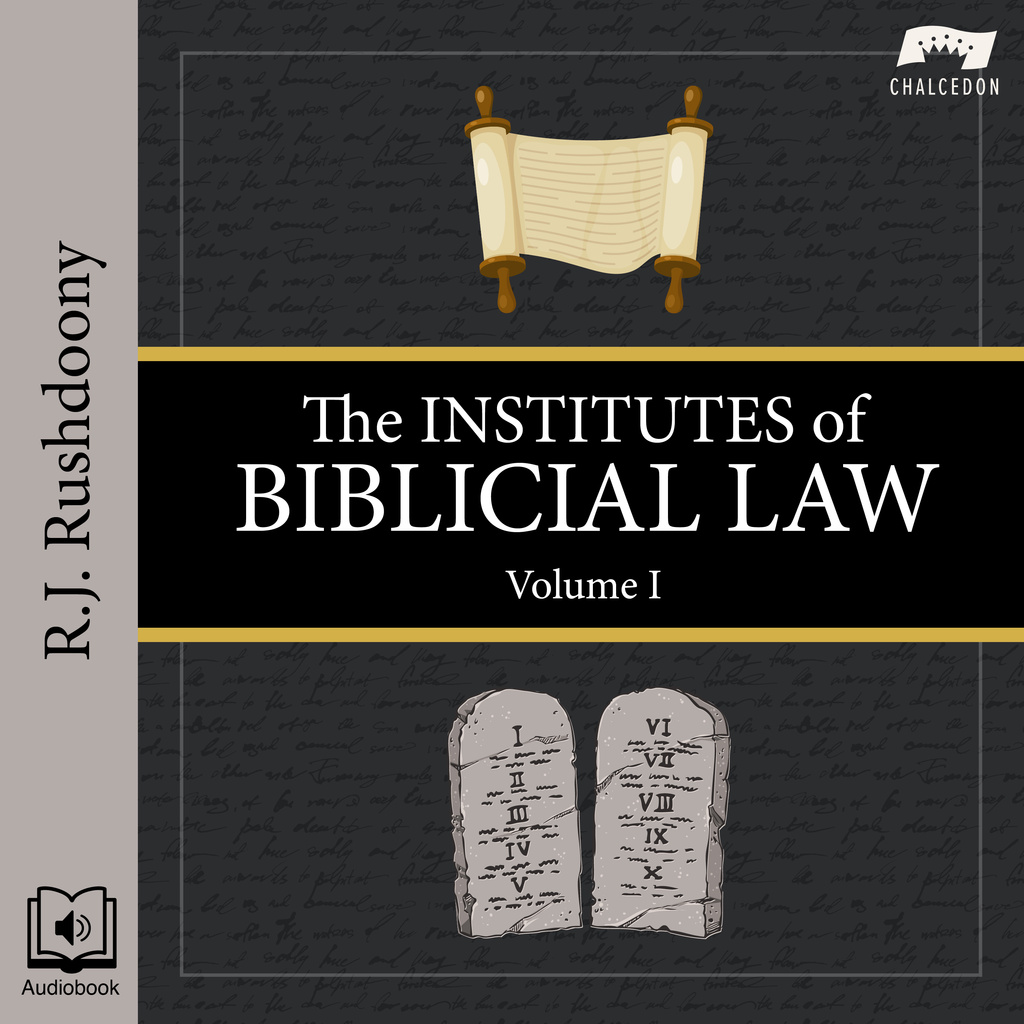
Institutes of Biblical Law Vol. 1
The Institutes of Biblical Law has as its purpose a reversal of the present trend. it is called "Institutes" in the older meaning of the that word, i.e., fundamental principles, here of law, because it is intended as a beginning, as an instituting consideration of that law which must govern society, and which shall govern society under God. To understand Biblical law, it is necessary to understand also certain basic characteristics of that law. In it, certain broad premises or principles are declared. These are declarations of basic law. The Ten Commandments give us such declarations.
Run Time: 56 hrs and 9 mins

- R. J. Rushdoony,
- Nathan Conkey
Audiobook Sample
Our newly printed 2020 edition with the same content by extended indexes (180 pages) which make it even more useful!
To attempt to study Scripture without studying its law is to deny it. To attempt to understand Western civilization apart from the impact of Biblical law within it and upon it is to seek a fictitious history and to reject twenty centuries and their progress.
The Institutes of Biblical Law has as its purpose a reversal of the present trend. it is called "Institutes" in the older meaning of the that word, i.e., fundamental principles, here of law, because it is intended as a beginning, as an instituting consideration of that law which must govern society, and which shall govern society under God.
To understand Biblical law, it is necessary to understand also certain basic characteristics of that law. In it, certain broad premises or principles are declared. These are declarations of basic law. The Ten Commandments give us such declarations.
A second characteristics of Biblical law, is that the major portion of the law is case law, i.e., the illustration of the basic principle in terms of specific cases. These specific cases are often illustrations of the extent of the application of the law; that is, by citing a minimal type of case, the necessary jurisdictions of the law are revealed.
The law, then, asserts principles and cites cases to develop the implications of those principles, with is purpose and direction the restitution of God's order.
"Let us examine again the mass murders of World War II, and the background of false witness during World War I and later. Life had become so cheap and meaningless to these heads of state and their camp followers that a murder or two meant nothing. Likewise, a generation schooled to violence in motion pictures, radio, literature, and press could not be expected to react to a murder or two. The result was a desperately twisted mentality which could only appreciate evil as evil on a massive scale. Did the Nazis actually execute many thousands, tens, or hundred thousands of Jews? Men to whom such murders were nothing had to blow up the figure to millions. Did the doctor perform a number of experiments on living men and women? A few sterilized women and a few castrated men and their horrified tears and grief are not enough to stir the sick and jaded tastes of modern man: make him guilty of performing 17,000 such operations. The evils were all too real: even greater is the evil of bearing false witness concerning them, because that false witness will produce an even more vicious reality in the next upheaval. Men are now “reconciled” to a world where millions are murdered, or are said to be murdered. What will be required in the way of action and propaganda next time?"
The Institutes of Biblical Law, page 599.

- R. J. Rushdoony
Rev. R.J. Rushdoony (1916–2001), was a leading theologian, church/state expert, and author of numerous works on the application of Biblical law to society. He started the Chalcedon Foundation in 1965. His Institutes of Biblical Law (1973) began the contemporary theonomy movement which posits the validity of Biblical law as God’s standard of obedience for all. He therefore saw God’s law as the basis of the modern Christian response to the cultural decline, one he attributed to the church’s false view of God’s law being opposed to His grace. This broad Christian response he described as “Christian Reconstruction.” He is credited with igniting the modern Christian school and homeschooling movements in the mid to late 20th century. He also traveled extensively lecturing and serving as an expert witness in numerous court cases regarding religious liberty. Many ministry and educational efforts that continue today, took their philosophical and Biblical roots from his lectures and books.
- Nathan Conkey